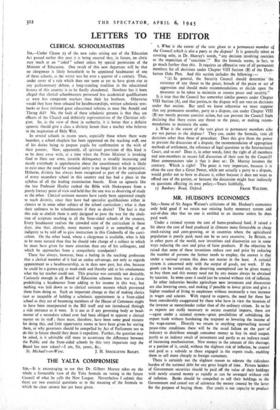THE YALTA COMPROMISE SIR, —It is encouraging to see that Dr.
Gilbert Murray takes on the whole a favourable view of the Yalta formula on voting in the future Council of what he calls the New League. Nevertheless I submit that there are two essential questions as to the meaning of the formula to which fit) clear answer has yet been given. r. What is the extent of the veto given to a permanent member of the Council which is also a party to the dispute? It is generally taken as covering only, in Dr. Murray's words, "any decision involving coercion or the imposition of ' sanctions '." But the formula seems, in fact, to go much further than this. It requires an affimative vote of all permanent members for all decisions under Chapter VIII Section (B) of the Dum- barton Oaks Plan. And this section includes the following:—
" (2) In general, the Security Council should determine the existence of any threat to the peace, breach of the peace or act of aggression and should make recommendations or decide upon the measures to be taken to maintain or restore peace and security." It is true that the Council has somewhat similar powers under Chapter VIII Section (A), and that parties to the dispute will not vote on decisions under that section. But until we know otherwise we must suppose that any permanent member, party to a dispute, can under Chapter VIII (B) not merely prevent coercive action, but can prevent the Council from declaring that there exists any threat to the peace, or making recom- mendations to maintain the same.
2. What is the extent of the veto given to permanent members who are not parties to the dispute? They can, under the formula, veto all decisions other than those of procedure. Does this give them the power to prevent the discussion of a dispute, the recommendation of appropriate methods of settlement, the reference of legal questions to the International Court, and so on? Does it, in other words, limit the right of all members and non-members to secure full discussion of their case by the Council? Most commentators take it that it does so: Dr. Murray assumes the contrary. Which is right? The point is very important, because it is
often the case that a Great Power, while not actually a party to a dispute, would prefer not to have to discuss it, either because it does not want to offend one of the parties, or because the discussion might bear indirectly on questions affecting its own policy.—Yours faithfully,


























 Previous page
Previous page